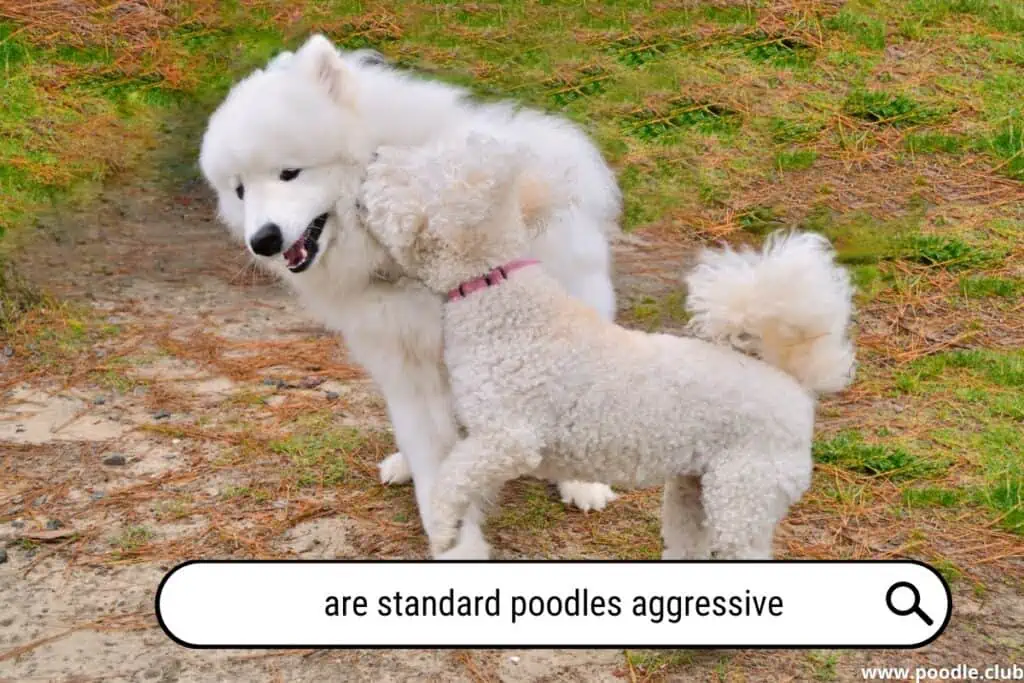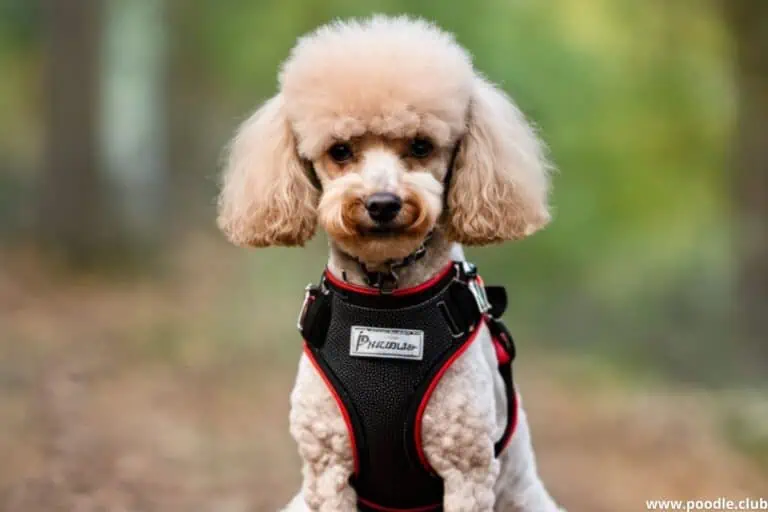Are Standard Poodles Aggressive?
Are Standard Poodles aggressive? This is a question often asked by potential dog owners considering this elegant and intelligent breed. To answer this, we need to look into various factors, from genetics to environmental influences.

While some research shows that certain types of Poodles may be more aggressive than others, it’s essential to remember that a dog’s behavior is shaped by a myriad of factors, including its upbringing, training, and socialization. For example, studies comparing Miniature Poodles, Goldendoodles, and Standard Poodles have found Miniature Poodles to be more aggressive.
That being said, it doesn’t mean every Standard Poodle will be gentle in all situations. Each dog is an individual, with a unique personality formed by its life experiences and interactions.
It’s also worth understanding the reasons that might lead to aggressive behavior in Standard Poodles. Fear, protective instincts, or insufficient socialization can all contribute to such tendencies. Unfamiliar or stressful situations might also cause reactive behavior. Therefore, owners should focus on providing proper training, socializing their dog early, and ensuring a caring environment. With patience, love, and proper guidance, Standard Poodles can become well-behaved, gentle companions.
Understanding Standard Poodle Aggression
Temperament and Personality
Standard Poodles are known for their intelligence and positive temperament. They are one of the most trainable breeds, which should make it easy to address any aggressive behavior. Although they can have strong personalities, they are typically not prone to aggression but rather have a friendly and sociable nature.
However, like any breed, there can be outliers. For instance, a Standard Poodle who didn’t have its morning coffee might be a tad grumpier than usual! Jokes aside, it’s essential to recognize that each dog is an individual with unique traits and tendencies.
Environmental Factors
The environment can play a significant role in shaping a Standard Poodle’s behavior. If a dog feels threatened, trapped, or under stress, it may exhibit aggressive behavior. For example, imagine a Standard Poodle living next to a construction site. The constant noise and activity might cause the dog to feel anxious, leading to aggression during walks or when exposed to new stimuli.
PuppySpot is a reputable dog marketplace where you can browse and find compatible puppies right from the comfort of your home. They have placed over 200,000 puppies into homes in the US!
On the other hand, a dog living in a calm, quiet home might generally have more relaxed behavior. So, remember, it’s not just pedigree, but also the environment that can shape a poodle’s personality.
Lack of Socialization
A key factor in reducing aggression for any dog, including Standard Poodles, is proper socialization. Lack of socialization can result in fearful and aggressive behavior in response to unfamiliar people, animals, or situations. Think of it as if you were suddenly thrust into a room full of strangers speaking a foreign language – you’d probably feel pretty stressed too!
To avoid this, socializing your Standard Poodle from an early age and consistently throughout their life is vital. This means exposing them to various environments, people, and other animals, essentially teaching them how to act in a friendly and confident manner.
In summary, while Standard Poodles are typically not aggressive by nature, various factors like environment and socialization play a crucial role in their behavior. After all, even the most well-bred Poodle can’t escape its upbringing! So, it’s essential to pay attention to your dog’s environment and ensure proper socialization for a happy, well-rounded canine companion.
Causes of Aggression in Standard Poodles
Fear and Anxiety
Standard Poodles, like any dog breed, can experience fear and anxiety, which can lead to aggression. For example, a poodle that’s startled by a loud noise might react with a bark or a growl. Noise reactivity in standard poodles has been studied, and it’s important for owners to be aware of this tendency. Managing a poodle’s anxiety through training and creating a safe environment can help prevent aggressive behavior.
Protectiveness and Territoriality
Poodles can also be protective of their owners or territorial about their space. This behavior, though usually well-intentioned, can result in aggression if a perceived threat encroaches. Keep in mind, even a friendly stranger can be seen as a threat by a protective poodle. Socializing your poodle with various people, places, and situations can help alleviate this kind of aggression.
Pain and Health Problems
Pain and health problems may cause a usually docile poodle to become aggressive. A dog in pain might growl or snap when touched, even if by a beloved family member. If your poodle is showing signs of aggression and it’s out of character, consult your veterinarian. Addressing underlying health issues promptly can result in a return to their normal, non-aggressive behavior.
Dominance Issues
Dominance issues can also contribute to aggression in Standard Poodles. A poodle exhibiting dominant behavior might try to assert control over their owner or other dogs by demonstrating aggressive actions like growling, baring teeth, or snapping. Proper training and establishing a clear hierarchy within the household is essential in managing and preventing dominance-based aggression.
To keep it light, just remember that Standard Poodles should be more focused on perfecting their fabulous hairdos than on being aggressive. By addressing issues like fear, anxiety, territoriality, and dominance, you can ensure your poodle remains the polite, fabulous furball they’re meant to be.
Recognizing Aggressive Behavior
When it comes to standard poodles, understanding aggression may seem challenging. Keep in mind that not all poodles display aggressive behavior, and it can often be linked to their upbringing and environment. But, let’s dive into some common signs of aggression.
Growling, Snarling and Barking
In the world of poodle aggression, growling, snarling, and barking are like the appetizers on a dinner menu. If your poodle constantly growls or snarls when approached, it could be feeling threatened. Barking, while often a form of communication, might be aggressive when it’s combined with other signs like growling or a tense body posture. Remember, they won’t say “beware of the poodle” for no reason.
Lunging and Biting
Now, we venture into the main course: lunging and biting. These behaviors are more serious and indicate that the poodle isn’t just warning you away – it’s actively trying to protect itself or its territory. If your standard poodle lunges at people or other animals, you’ll want to address this issue promptly, or it might escalate. Biting, of course, is the most severe form of aggressive behavior and may require professional intervention.
Possessiveness and Guarding
Finally, let’s explore possessiveness and guarding. Your poodle might have an unhealthy attachment to certain items or places. You’ve heard of “guard dogs”, but a standard poodle guarding its food bowl or favorite toy like it’s the crown jewels can be a sign of aggression. This behavior could manifest through growling, snarling, or even biting when someone approaches their prized possession.
To sum it up, while not all standard poodles show aggressive tendencies, it’s essential to keep an eye out for signs like growling, snarling, barking, lunging, biting, possessiveness, and territoriality. Keep in mind that addressing aggressive behavior early on can prevent further issues and ensure that both you and your poodle stay on good terms. And hey, who knew those elegant, curly-haired beings speak a language of their own – the art of poodle aggression!
How to Handle Aggression
Socialization and Training
Socializing a Standard Poodle from an early age plays a crucial role in preventing aggressive behavior. Expose your furry friend to various environments, people, and other animals to help them develop confidence and adaptability. Start by taking them for walks in the park, visiting family and friends with pets, or enroll them in puppy playgroups. Remember the golden rule: a well-socialized poodle is a happy poodle!
Obedience and Behavioral Training
Obedience and behavioral training go hand in hand in curbing aggression in Standard Poodles. These smarty-pants dogs excel at learning new commands, and with proper training, they can become ideal companions. Incorporate positive reinforcement when teaching basic commands such as “sit,” “stay,” and “heel.” Just imagine how impressed your friends will be when your poodle sits obediently instead of turning into a barking tornado!
Seeking Professional Help
If your Standard Poodle continues to exhibit aggressive behavior despite your best efforts, it’s time to seek professional help. Consult with a knowledgeable dog trainer or behaviorist who can evaluate your dog’s specific needs and tailor a training program accordingly. After all, there’s no shame in asking for a helping paw from experts to ensure your poodle is the best version of themselves!
Remember, handling aggression in Standard Poodles requires patience, dedication, and consistency. With the right training, socialization, and professional assistance when needed, your poodle can impart a wagging tale of success!
Preventing Aggression in Puppies
Early Experiences and Environment
Creating a positive environment for a Standard Poodle puppy is crucial in preventing aggression. From their early days, puppies should be introduced to a variety of sights, sounds, and smells that will stimulate their developing minds. Providing a comfortable and safe space for them to explore, play, and rest can help reduce anxiety and stress, which are often factors in aggressive behavior.
One humorous example of a stress-relieving activity for puppies is the “puppy massage.” Gently massaging your puppy, like a mini canine spa day, can help them feel relaxed, and build trust with their human companions.
Proper Socialization and Exposure
Standard Poodles, like any breed, can benefit greatly from proper socialization during their formative weeks and months. As noted by Science Direct, intact male dogs may exhibit more aggression towards other males, which can be mitigated through proper socialization.
Introduce your puppy to new and diverse people, animals, and environments as early as possible. Remember the phrase “the more, the merrier” when it comes to your poodle meeting other dogs, humans, and various landscapes. This wide range of experiences will contribute to your puppy’s adaptability and sociability, lowering the risk of aggressive behavior.
Consistent Training and Boundaries
Consistency is key when it comes to training a Standard Poodle puppy. Establish clear and consistent boundaries using positive reinforcement techniques. For example, reward your puppy with treats and praise when they follow commands, and redirect their attention when they become too excited or boisterous.
An analogy to keep in mind is the “traffic light system.” Your puppy should understand that green lights (following commands) lead to rewards, while red lights (aggressive behaviors) lead to no rewards, and redirection.
Combine these elements of positive experiences, proper socialization, and consistent training to mold your Standard Poodle puppy into a well-rounded, well-mannered, and non-aggressive canine companion. By doing so, you can nurture a lasting bond between you and your four-legged friend, ensuring a harmonious relationship for years to come.
Standard Poodles as Family Pets
Interaction with Children
Standard Poodles are known to be friendly and loyal companions, making them a great choice for families with children. They are gentle and patient, which allows them to get along well with kids of all ages. Their inherent intelligence also helps them quickly adapt to the energy levels of young ones. Be sure to supervise interactions and teach your child how to safely approach and play with the dog to ensure a positive experience for both.
Compatibility with Other Dogs and Pets
Standard Poodles generally get along well with other dogs and pets. Their social nature allows them to form strong bonds with their fellow furry family members. However, it is essential to remember that every dog has its own personality and early socialization with other animals is crucial for building a harmonious household.
Here are some tips for socializing your poodle with other pets:
- Start socializing them from a young age.
- Gradually introduce them to different types of pets.
- Always supervise initial interactions.
- Reward positive behavior and interactions.
General Tips for a Peaceful Home
To maintain a peaceful and serene home environment with a Standard Poodle, follow these basic guidelines:
- Commit to regular exercise and mental stimulation. Poodles are highly intelligent and energetic; keeping them physically and mentally engaged will prevent boredom-related behavior issues.
- Consistent training is essential. Use positive reinforcement to teach your dog basic commands and household rules.
- Grooming keeps your poodle healthy and looking good. Regular brushing, trimming, and bathing will minimize shedding and ensure they stay clean.
- Provide a safe and comfortable space for your dog with their own bed, toys, and designated feeding area. This will help them feel secure and understand their place in the family.
Remember, a well-adjusted and happy Standard Poodle makes a fantastic family pet. Their natural loyalty, intelligence, and gentle nature are sure to please all members of the household.







